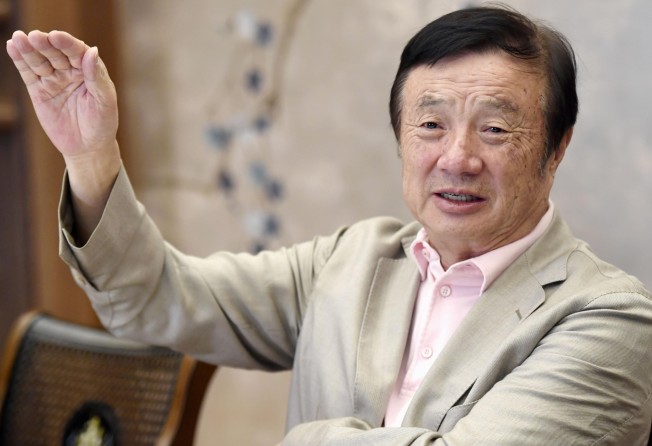Huawei founder calls on Europe, Japan to step up development of alternative tech amid US blacklist
- The US trade ban restricts the Chinese telecoms equipment giant from buying vital American hi-tech components

Ren Zhengfei, founder and chief executive of Huawei Technologies, is looking to hi-tech suppliers in Europe and Japan for support, as the Chinese telecommunications equipment maker nears its sixth month on the US government’s trade blacklist.
“It remains a question mark for Chinese companies [to create alternatives to core technologies from the US] because of their relatively low-end skills,” Ren said on Wednesday at a panel discussion hosted by Huawei at its headquarters in Shenzhen.
That was not an issue for hi-tech companies in Japan and Europe, especially Germany, according to Ren, without elaborating on the identity of these firms. “So why shouldn’t they seize the opportunity to grow and develop [these alternative technologies]?”
Ren’s call comes as Huawei, the world’s largest telecoms equipment supplier and second biggest smartphone vendor, continued to keep its global business afloat, despite being added by the Trump administration to Washington’s Entity List in May over security concerns. That has restricted Huawei’s access to vital hardware, software and services from American hi-tech suppliers, escalating trade tensions between the US and China.
The privately-held company recorded revenue of 209.5 billion yuan (US$29.9 billion) in the quarter ended September, up 26.7 per cent from a year earlier. It has secured more than 60 commercial 5G mobile network supply contracts to lead the industry, as it started to build 5G base stations without US components from September.
Its global smartphone shipments rose 29 per cent in the third quarter to 66.8 million units, behind Samsung Electronics’ 78.9 million units, according to research firm Canalys.
Ren, however, said Huawei will have a clearer picture next year on how its business has held up under the US trade ban.
“If you come talk with me at this time next year, you would see if we are still growing,” Ren said. “We have to focus on our business for the next three to five years … to lead the market.”
That is why it was important that other countries foster alternative hi-tech suppliers, as the US limits access to American technologies to certain companies, according to Ren. He was joined in the panel discussion by Kishore Mahbubani, a fellow at the Asia Research Institute of the National University of Singapore and former president of the UN Security Council, as well as Detlef Zuehlke, the so-called spiritual father of the smart factory.
To be sure, Ren said Huawei was keen to continue its long-term collaboration with US hi-tech suppliers.
Washington is expected to allow US companies to start selling to Huawei “very soon”, according to US Commerce Secretary Wilbur Ross in an interview with Bloomberg that aired on Sunday. Ross said the US government had already received 206 requests from US suppliers – more than what was initially expected.
That move by the US government could not have come at a better time for Huawei, which estimated that it was on track to ship from 240 million to 250 million smartphones this year. Ren described that estimate as the “worst scenario” for Huawei’s smartphone business. Smartphones are under the company’s consumer business group, which accounts for more than half of the firm’s annual revenue.
Huawei was forced to delay release of its new Mate 30 series smartphones in Europe, its biggest market outside China, because the handsets have no access to Google apps and services under the US trade ban.
For more insights into China tech, sign up for our tech newsletters, subscribe to our Inside China Tech podcast, and download the comprehensive 2019 China Internet Report. Also roam China Tech City, an award-winning interactive digital map at our sister site Abacus.